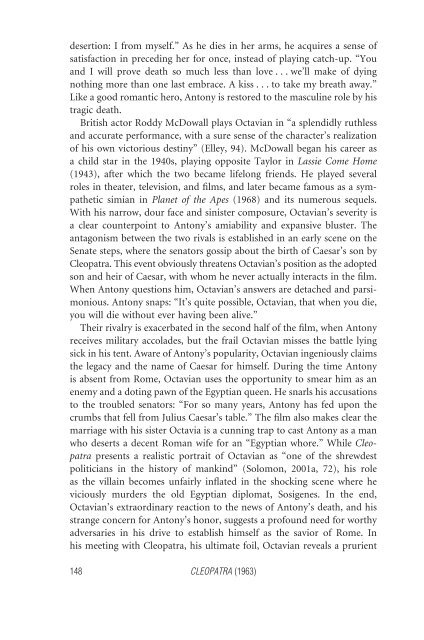Big Screen Rome - Amazon Web Services
Big Screen Rome - Amazon Web Services
Big Screen Rome - Amazon Web Services
You also want an ePaper? Increase the reach of your titles
YUMPU automatically turns print PDFs into web optimized ePapers that Google loves.
desertion: I from myself.” As he dies in her arms, he acquires a sense of<br />
satisfaction in preceding her for once, instead of playing catch-up. “You<br />
and I will prove death so much less than love . . . we’ll make of dying<br />
nothing more than one last embrace. A kiss . . . to take my breath away.”<br />
Like a good romantic hero, Antony is restored to the masculine role by his<br />
tragic death.<br />
British actor Roddy McDowall plays Octavian in “a splendidly ruthless<br />
and accurate performance, with a sure sense of the character’s realization<br />
of his own victorious destiny” (Elley, 94). McDowall began his career as<br />
a child star in the 1940s, playing opposite Taylor in Lassie Come Home<br />
(1943), after which the two became lifelong friends. He played several<br />
roles in theater, television, and films, and later became famous as a sympathetic<br />
simian in Planet of the Apes (1968) and its numerous sequels.<br />
With his narrow, dour face and sinister composure, Octavian’s severity is<br />
a clear counterpoint to Antony’s amiability and expansive bluster. The<br />
antagonism between the two rivals is established in an early scene on the<br />
Senate steps, where the senators gossip about the birth of Caesar’s son by<br />
Cleopatra. This event obviously threatens Octavian’s position as the adopted<br />
son and heir of Caesar, with whom he never actually interacts in the film.<br />
When Antony questions him, Octavian’s answers are detached and parsimonious.<br />
Antony snaps: “It’s quite possible, Octavian, that when you die,<br />
you will die without ever having been alive.”<br />
Their rivalry is exacerbated in the second half of the film, when Antony<br />
receives military accolades, but the frail Octavian misses the battle lying<br />
sick in his tent. Aware of Antony’s popularity, Octavian ingeniously claims<br />
the legacy and the name of Caesar for himself. During the time Antony<br />
is absent from <strong>Rome</strong>, Octavian uses the opportunity to smear him as an<br />
enemy and a doting pawn of the Egyptian queen. He snarls his accusations<br />
to the troubled senators: “For so many years, Antony has fed upon the<br />
crumbs that fell from Julius Caesar’s table.” The film also makes clear the<br />
marriage with his sister Octavia is a cunning trap to cast Antony as a man<br />
who deserts a decent Roman wife for an “Egyptian whore.” While Cleopatra<br />
presents a realistic portrait of Octavian as “one of the shrewdest<br />
politicians in the history of mankind” (Solomon, 2001a, 72), his role<br />
as the villain becomes unfairly inflated in the shocking scene where he<br />
viciously murders the old Egyptian diplomat, Sosigenes. In the end,<br />
Octavian’s extraordinary reaction to the news of Antony’s death, and his<br />
strange concern for Antony’s honor, suggests a profound need for worthy<br />
adversaries in his drive to establish himself as the savior of <strong>Rome</strong>. In<br />
his meeting with Cleopatra, his ultimate foil, Octavian reveals a prurient<br />
148 CLEOPATRA (1963)



